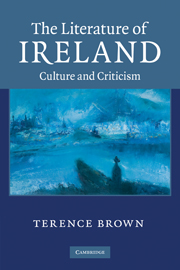Book contents
- Frontmatter
- Contents
- Acknowledgements
- Introduction
- 1 The Literary Revival: historical perspectives
- 2 Joyce's magic lantern
- 3 Music: the cultural issue
- 4 Modernism and revolution: rereading Yeats's ‘Easter 1916’
- 5 Shakespeare and the Irish self
- 6 Irish literature and the Great War
- 7 Ireland, Modernism and the 1930s
- 8 Post-modernists: Samuel Beckett and Flann O'Brien
- 9 Patrick Kavanagh: religious poet
- 10 MacNeice's Irelands: MacNeice's islands
- 11 Louis MacNeice and the Second World War
- 12 MacNeice and the puritan tradition
- 13 John Hewitt and memory: a reflection
- 14 Michael Longley and the Irish poetic tradition
- 15 Seamus Heaney: the witnessing eye and the speaking tongue
- 16 Derek Mahon: the poet and painting
- 17 Telling tales: Kennelly's Cromwell and Muldoon's ‘The More a Man Has the More a Man Wants’
- 18 Redeeming the time: John McGahern and John Banville
- 19 ‘Have we a context?’: transition, self and society in the theatre of Brian Friel
- 20 Hubert Butler and nationalism
- 21 The Irish Dylan Thomas: versions and influences
- Index
- References
16 - Derek Mahon: the poet and painting
Published online by Cambridge University Press: 05 June 2012
- Frontmatter
- Contents
- Acknowledgements
- Introduction
- 1 The Literary Revival: historical perspectives
- 2 Joyce's magic lantern
- 3 Music: the cultural issue
- 4 Modernism and revolution: rereading Yeats's ‘Easter 1916’
- 5 Shakespeare and the Irish self
- 6 Irish literature and the Great War
- 7 Ireland, Modernism and the 1930s
- 8 Post-modernists: Samuel Beckett and Flann O'Brien
- 9 Patrick Kavanagh: religious poet
- 10 MacNeice's Irelands: MacNeice's islands
- 11 Louis MacNeice and the Second World War
- 12 MacNeice and the puritan tradition
- 13 John Hewitt and memory: a reflection
- 14 Michael Longley and the Irish poetic tradition
- 15 Seamus Heaney: the witnessing eye and the speaking tongue
- 16 Derek Mahon: the poet and painting
- 17 Telling tales: Kennelly's Cromwell and Muldoon's ‘The More a Man Has the More a Man Wants’
- 18 Redeeming the time: John McGahern and John Banville
- 19 ‘Have we a context?’: transition, self and society in the theatre of Brian Friel
- 20 Hubert Butler and nationalism
- 21 The Irish Dylan Thomas: versions and influences
- Index
- References
Summary
Light plays a crucial part in the imaginative world of Derek Mahon's poetry. He is in fact a markedly visual poet, one who attends patiently, even contemplatively, to the look of things and especially to the way light falls on them. The opening stanza of ‘A Postcard from Berlin’ is entirely typical of a poet whose impressions of the world are refracted through an eye caught by the glimmer of light on water, the flash of sunlight through cloud, the bright glitter of the sea, the glistening of moonlight on rainwater:
We know the cities by their stones
Where Ararat flood-water shines
And violets have struggled through
The bloody dust. Skies are the blue
Of postcard skies, and the leaves green
In that quaint corner of Berlin.
Wool-gatheringly, the clouds migrate:
No checkpoint checks their tenuous flight.
Mahon seems fascinated by the idea of a landscape lit as if by some creative light that purifies everyday experience. So Aran in ‘Thinking of Inis Oir in Cambridge, Mass.’ is for him
A dream of limestone in sea-light
Where gulls have placed their perfect prints.
Reflection in that final sky
Shames vision into simple sight;
Into pure sense, experience.
(p. 25)And in ‘Aran’ the island is ‘unearthly still in its white weather’ (p. 31). He is moved too by the moment when light breaks in darkness, when shadow suddenly releases its hold on the mind.
- Type
- Chapter
- Information
- The Literature of IrelandCulture and Criticism, pp. 199 - 209Publisher: Cambridge University PressPrint publication year: 2010



